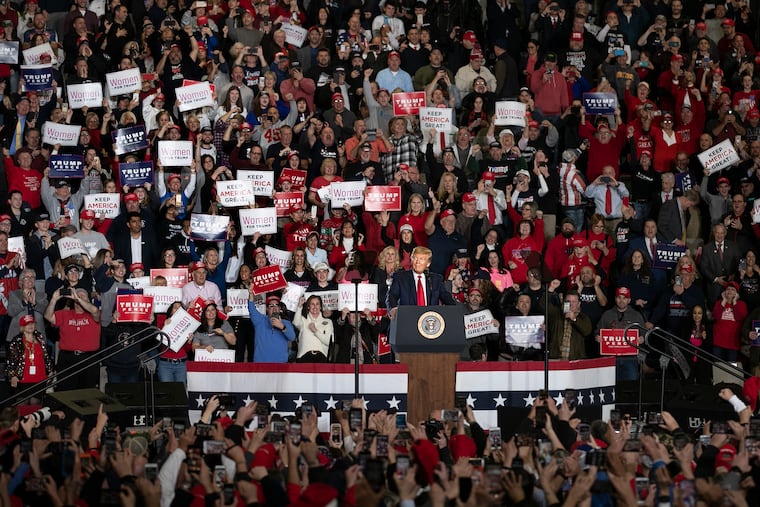Costly presidential campaign rallies leave cities wondering who’s paying the bill
Across the country and party lines, candidates have racked up unpaid tabs — an issue bound to plague Pennsylvania ahead of the 2020 election as politicians flock to the swing state.

President Donald Trump came and went from Wildwood in a matter of hours last week, singing the praises of newly minted Republican Rep. Jeff Van Drew, while drawing crowds of supporters and protesters to the dormant winter Shore town.
But long after the president left town, remnants of the rally remained, and city employees spent two long nights cleaning up garbage, beach chairs, signs, and blankets from outside the Wildwoods Convention Center.
A week later, Wildwood is still tabulating the costs for extra policing and cleanup, and Mayor Pete Byron says he just wants his city’s money back.
“We don’t have a huge budget here," Byron said. "We had people out from the public works department. Probably every policeman was expected to work those days. ... We want to be sure we get all our costs reimbursed.”
Who pays when a candidate comes to town?
Wildwood is hardly the first, or likely the last, city to encounter billing trouble when a presidential candidate comes to town.
Across the country and party lines, candidates have racked up unpaid tabs — an issue bound to plague Pennsylvania ahead of the 2020 election as politicians flock to the swing state.
So who pays when a presidential candidate comes to town?
The answer is complicated, said William L. Rosenberg, a professor of political science at Drexel University. And when it comes to the sitting president, he said, the lines between political and presidential visits are “blurred," making reimbursement even more difficult for the hosting city.
“What generally happens is they don’t make full restitution,” Rosenberg said. "Whoever receives the visit ends up bearing varying degrees of the expense.”
Byron, a registered Democrat, emphasized that his request for reimbursement for Wildwood, with a year-round population of 5,000, has “nothing to do with party affiliation,” and everything to do with the tourist town’s finances.
The Trump campaign paid the Wildwoods Convention Center a standard rental hall fee of $7,500 for its visit, and will also be billed by the Greater Wildwoods Tourism Authority — a private organization — within the next week for ancillary charges related to the rally, a spokesperson said.
A Trump campaign official referred all billing questions to the U.S. Secret Service. A Secret Service spokesperson said that the agency “cannot speak to the conditions surrounding the mechanisms in place for reimbursement to local law enforcement” but that the Secret Service does not pay for police overtime associated with protective visits.
“It’s pretty difficult to submit an invoice for this," Rosenberg said. "First, there’s the question of who are you going to submit it to. There’s a whole lot of slippage that goes on.”
Large bills, little recourse
When it comes to billing candidates, policies vary among cities.
Some, like Philadelphia, don’t bother with charging candidates for police overtime. Under Philadelphia’s permit policy, rallies and demonstrations are not charged for costs associated with public safety, a city spokesperson said.
Candidates rallying in Philadelphia are later billed for city hours not related to public safety, like sanitation services, placement of barricades, or staging on city grounds.
But municipalities have little recourse when it comes to enforcing those bills.
According to an analysis by the Center for Public Integrity, leading up to the 2016 election, presidential candidates racked up hundreds of thousands of dollars in outstanding bills related to campaign events in cities across the country.
Even now, with the next presidential election cycle underway, a $2,678 invoice for non-public safety services related to Hillary Clinton’s 2016 pre-Pennsylvania primary rally at Philadelphia City Hall remains unpaid, as does a $35,129 public safety bill for a Trump 2016 campaign stop in Erie.
“At this point, we don’t believe [reimbursement] is likely,” said Erie chief of staff Renee Lamis.
When officials in Upper Providence Township took Sen. Bernie Sanders to task over a $25,620 public safety bill related to a 2016 campaign stop, the parties settled on the campaign paying $2,250 to the Delaware County police department rather than taking Sanders to court, the Center for Public Integrity reported.
“Who wants to get bogged down in that?” Police Chief Mark Toomey asked.
When Trump rallied in Derry Township near Hershey in December, local officials opted to absorb the costs of security, prompting outcry from residents. Former GOP gubernatorial nominee Scott Wagner later offered to pay up to $20,000 of the municipality’s tab.
Meanwhile, in Wisconsin, another swing state, police are attempting to combat the mounting unpaid security bills by charging candidates up front for local security during 2020 campaign stops.
‘An economic shot in the arm’
Regardless of the cost, the national exposure can prove to be a “big plus,” Rosenberg said.
In the long term, he said, “people all over the world heard about Wildwood,” and that publicity can bolster tourism and civic pride, as well as an immediate economic boost for area hotels and restaurants.
Despite uncertainty around his city’s reimbursement, Byron said he’s grateful Trump chose to come to Wildwood, bringing an estimated crowd of 15,000 to the Shore town during a slow winter month.
“It was an economic shot in the arm for us, not to mention the national exposure it’s brought us," Byron said. "Any president who calls is welcome in Wildwood.”